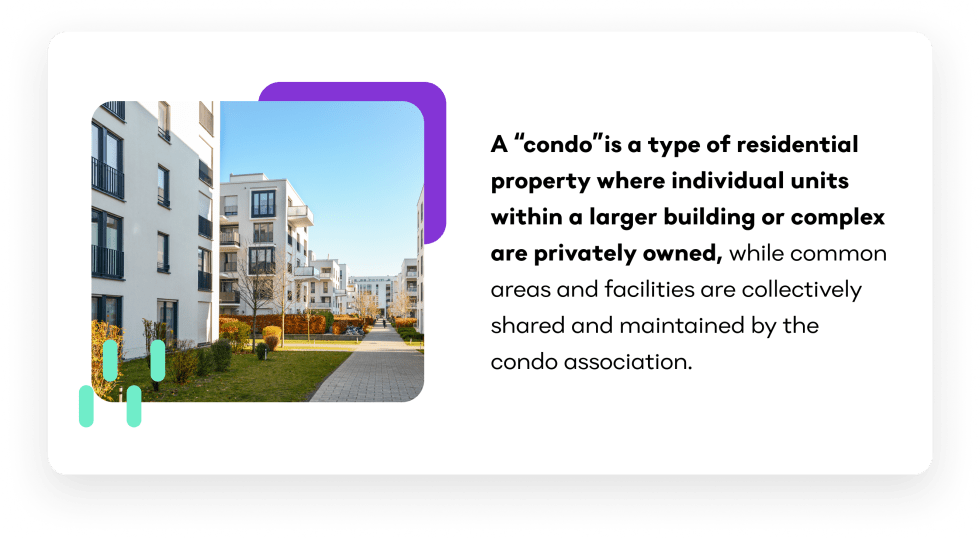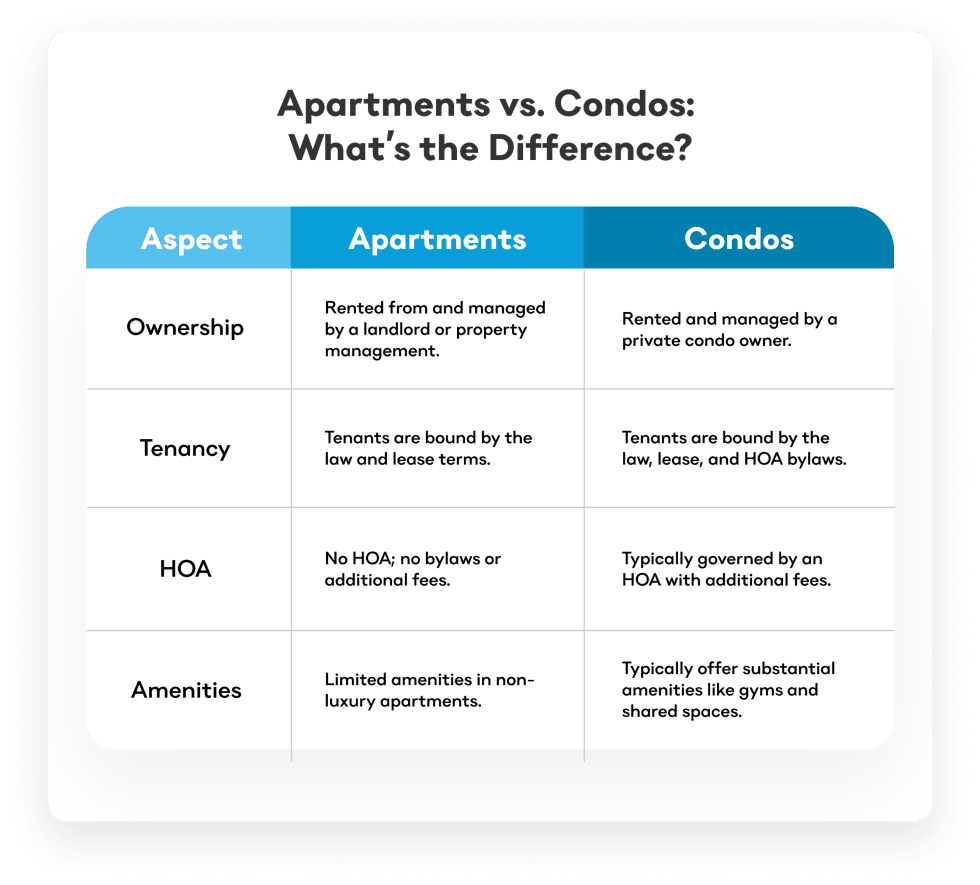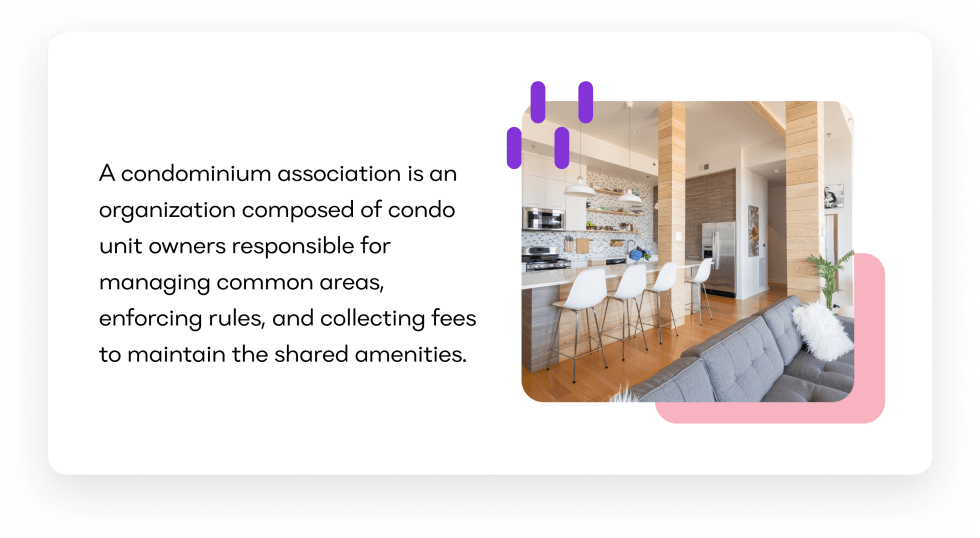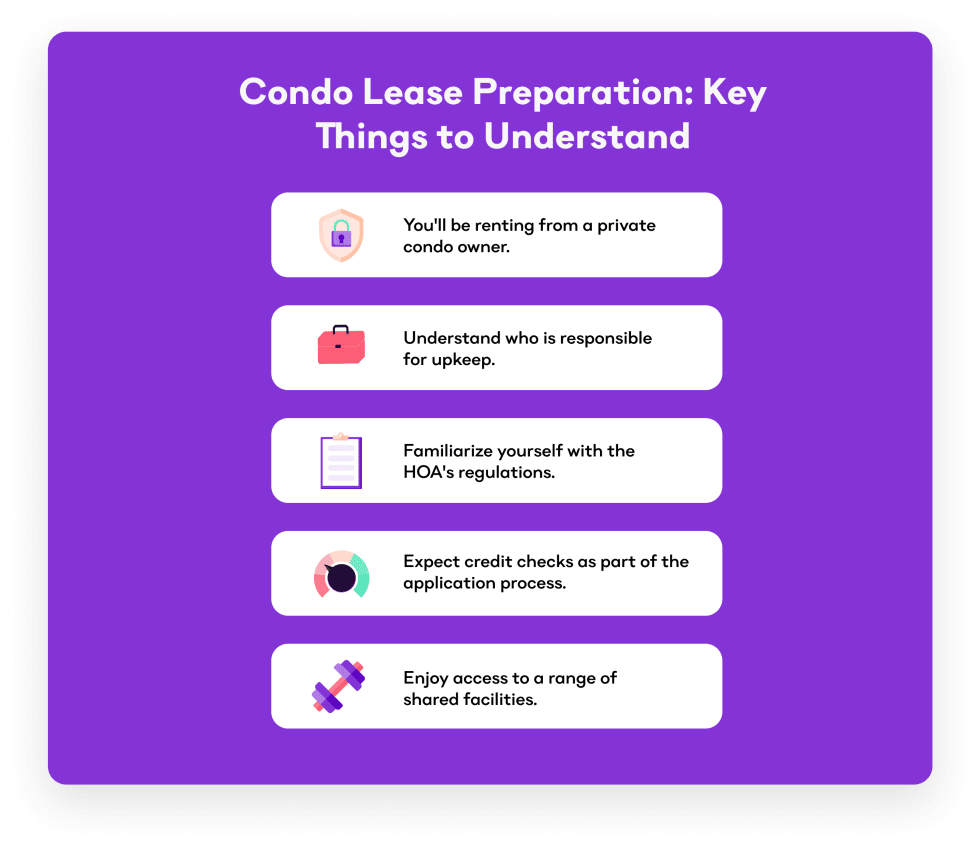- 46 units available
- 1 bed • 2 bed • 3 bed
- Amenities
In unit laundry, Hardwood floors, Dishwasher, 24hr maintenance, Stainless steel, Walk in closets + more

If you're on the hunt for your next apartment, then you're likely spending your days browsing through tons of apartment listings (hopefully with us).
These listings typically have one thing in common: they use confusing rental terminology. You know the type. What does kitchenette mean? What about garden-level? How about, "What is a condo?" or "How do condos differ from apartments?"
Though many confuse the two terms, a condominium or condo is distinct from a traditional apartment in many ways. While you may find your dream home with either option, there are some finer points that will influence your decision. In short, choosing between a traditional apartment and a condo can be challenging, and it's important to know exactly what condos are.
Here's everything you need to know about condos.
Condominiums (or "condos") are private living units within a residential building or complex. Ownership is the key difference between condos and apartments. Individuals purchase condominiums (including the deed and rights to sale) within a building or complex, whereas apartment buildings (and all the units in them) are generally owned by one person or company and rented out. However, as we will see, it's certainly possible to rent a condominium.
Condominiums may share one or more walls with neighbors, or they may be detached (i.e. freestanding). In all cases, condos are part of a condominium association, which is an organization that represents the collective interest of the condo community.

Think of your condo as your own personal castle within the larger community. You own the "air space" within your unit, encompassing everything from walls and floors to fixtures and any permanent attachments. Decks or patios might fall under your domain too, depending on the specific building layout and agreements. This is your space to personalize, paint your favorite colors, and truly make your own.
While your unit is your kingdom, remember the building's exterior, hallways, lobbies, and other common areas like gyms and rooftop gardens? Those belong to the condominium association. This "co-op" ownership structure sets condos apart from apartments. You and your fellow condo owners are like shareholders, pooling resources to maintain and enhance these shared spaces that make your everyday life a breeze.
Apartment or condominium? That’s the question.
Let's take a look at the essential features of an apartment vs. a condo.
While there are important factors to consider, the decision will largely come down to what you are specifically looking for in a home.
Explore our in-depth comparison of condos vs. apartments to better understand which one best suits your lifestyle and rental needs.

When renting a condo, you’re renting a unit from a private owner rather than a property management company or landlord who owns the entire building. The individual will set the rental price, provide the lease details, and have their own rules and regulations for renting out their unit.
Overall, if you're renting a condo, you probably won't notice much difference between it and a traditional apartment unit, with a few caveats. Condos are more commonly associated with great community amenities and tend to be located in larger cities. You may also see condominium association fees as part of your monthly rent payment.
A condominium association (or sometimes a Homeowners Association or HOA) is an organization that serves as the governing body for a community of homeowners. They are made up of volunteer members within the condominium community. These individuals are traditionally elected by condo owners, within the community.
As a governing body, condo associations handle many of the responsibilities that a landlord or property management company would cover. Although what HOAs cover varies from community to community, they'll often cover things like common spaces, landscaping, maintenance/repairs, and common utilities.
Generally, condo fees are split. One half usually covers recurring expenses and the other half is put into a reserve fund. That fund is used to cover emergency expenses or future projects.

At the heart of a well-managed condominium is the Declaration of Covenants, Conditions, and Restrictions, a legal document outlining the rules for residents. This includes permissible uses of the units, rights to common areas, election processes for the HOA board, and monthly fees due from residents. These fees, paid by all unit owners, cover the building's insurance, shared utilities, and the reserve for future maintenance. It's essential to understand that these fees can increase over time, especially if significant maintenance arises that exceeds the reserve fund.
Effective financial management is key when looking to rent or own a condo. Adequate insurance coverage for individual units is mandatory to protect against various risks. Additionally, compliance with legal and regulatory standards, such as local building codes and zoning laws, is vital to ensure the safety, legality, and smooth operation of the condominium.
According to recent data, HOA fees usually run from anywhere between $100 to $700 a month. However, studies show that the average monthly HOA fee is $263 per month or $3,156 per year.
In most cases, when you purchase a condo, you buy into the condo association by default. As a condo owner and member, you will be required to pay fees or dues.
As these fees go toward typical maintenance and repairs, they also allow access to common areas and amenities. Those may include on-site laundry, gyms, pools, and more. Not to mention, you get to live in a well-maintained building.
However, this may push the unit just out of your budget. So, it's a trade-off you'll have to consider before making a final decision to rent a condo. Be sure to ask the condo owner you are considering renting from what's included in the monthly rent.
Step into the diverse world of condos – from trendy high-rises to quaint detached homes, discover the unique lifestyle each offers.
In the heart of the city's vibrant pulse, high-rise condos offer an unparalleled vantage point to savor the urban symphony. Picture yourself waking up to breathtaking panoramas that stretch as far as the eye can see—sunlight dancing on glass towers, twinkling city lights at night, and breathtaking sunsets painting the sky in a vibrant canvas of colors.
High-rise living isn't just about views; it's about a lifestyle that elevates your everyday experiences. Step onto your private balcony to feel the cool morning breeze against your skin as you sip your coffee, or unwind after a long day to the mesmerizing city lights that stretch out beneath you.
Ah, mid-rise condos. They sit nestled between high-rise skyscrapers and quaint low-rise buildings, offering a unique blend of bustling city vibes and laid-back neighborhood charm. Think rooftop yoga sessions with panoramic city views followed by cozy coffee mornings at the local cafe down the street. Mid-rise living is all about striking that perfect balance between urban convenience and a sense of community.
Step away from the urban symphony of honking horns and towering skyscrapers. Low-rise condos offer a refreshing retreat, where quaint charm embraces city convenience. Think picture-perfect courtyards buzzing with friendly faces, intimate rooftop gatherings under starry skies, and your own little outdoor haven within steps of your front door.
Craving the freedom of a single-family home, but without the maintenance hassle? Detached condos offer the best of both worlds. Imagine your own charming home, complete with a private yard or patio, nestled within a friendly community. Enjoy the perks of shared amenities and a built-in support system, freeing you to relish your own little oasis and the vibrant spirit of neighborhood life.
Discover the pros and cons of condo living, from enjoying a maintenance-free lifestyle and community amenities to considering space limitations and association fees.
Dive into the unique aspects of condo living that make it an increasingly popular choice for urban dwellers seeking a balanced, convenient lifestyle.
Explore the challenges of condo living, from navigating HOA rules and potentially noisy neighbors to balancing community living with personal privacy.
Now that we've navigated the ups and downs of condo living, let's embark on our next exploration: understanding what you need to know before deciding to rent a condominium.
When deciding between renting a condo or a traditional apartment, it's important to consider the essential differences between both options. This will ensure that you’re able to make an informed decision on the matter.
Here’s a breakdown of the most important details to consider before renting a condo:
As this is the primary difference between renting a traditional apartment and renting a condo, it's important to explore the effects of this setup.
When renting a condo from an individual, you may have to contend with the fact that they’re not an experienced landlord. They may not be familiar with some of the typical protocols that come with being a landlord. This can possibly lead to headaches on your end.
The best way to avoid these problems is to ensure that you check and double-check your lease agreement before signing. You want to be sure that all possible situations are covered and clear in your lease agreement. This includes everything from parking, who’s responsible for covering repairs, whether you need renters insurance, pet policies, and everything in between.
Additionally, don't be afraid to ask for the HOA bylaws upfront. It's important to review these, as well.
While there are advantages to renting into an HOA, there are also some disadvantages. Those may include strict rules that could affect whether you would want to live there.
These rules can govern anything from decorations, pet restrictions, and noise levels. Failure to adhere to these rules can result in a fine for yourself or the condo owner, depending on HOA bylaws.
One of the biggest advantages of renting a condo is the access to many coveted amenities that they provide. Though you may have to pay a little extra in HOA fees, condos often offer more amenities than a typical apartment building. They’re on par with many luxury apartments.
Though these amenities may not be the tide-changer, they’re important to note for renters whose dream apartment comes with plenty of amenity options.
Here are a few common condominium community amenities to look out for that'll be sure to enhance your rental experience.

When maintenance issues arise in your apartment, you can call your landlord and have the maintenance team take care of them. When it comes to renting a condo, maintenance can either be a breeze or a headache.
If your HOA covers maintenance and is simple to request, renters can usually expect swift action and professional support. However, this may not be the case when your landlord is responsible for handing and covering the cost of repairs without the help of the HOA.
For example, an experienced landlord would generally be on top of repairs to your apartment. They might be able to perform a repair themselves, or they may have contacts for third-party businesses to get the job done.
However, inexperienced landlords may not be able to pull this off. They may cheap out on the service. Or, worse yet, they may be inexperienced and try to fix the problem themselves. This can lead to a world of trouble for you as a renter.
Be sure to inquire about repairs and maintenance prior to signing your lease agreement. If you’re responsible for covering the cost of repairs, you will need to consider these costs in your budget.
While a traditional apartment has a set of guidelines for all tenants regarding tenant behavior, rights, pets, and more, condo rules are a bit more complex.
When renting a condo, you will have to abide by two sets of rules: those set by the condo owner and those set by the HOA. As you’re renting from an individual, they may have very specific rules regarding tenants residing in their unit.
One thing to note about landlord rules for a condo is that it's very easy for inexperienced landlords to put in rules that don't comply with laws that protect tenant rights. This is usually unintentional due to a lack of experience. However, the effects can still be harmful to a renter.
For example, rent raises without due notice, illegal evictions, or entering the unit without the tenant’s permission should be causes for concern.
Being proactive is essential. Do not sign your lease agreement without reading it over. This is the only way to protect yourself in advance. Otherwise, you’ll be fighting an uphill battle if any of those things do occur.
Let’s move on to the HOA's rules. HOAs can enforce strict rules that have significant consequences when people breach them. It’s essential to read HOA bylaws before renting a condo.
While applying for a traditional apartment unit generally requires a credit check, this may not be the case when renting a condo from a private owner.
However, you’ll likely still have to produce some means of proving that you can cover monthly expenses. These include proof of gainful employment and proof of income.
Private owners may be more flexible. However, traditional property management companies or professional landlords may have strict income and credit requirements.
Be sure to watch out for rental scams. Some scammers will list a unit for rent without the owner’s permission. They just want to get your money. They don’t care about your credit history or ability to pay rent on time.
If your contact asks for money upfront and doesn’t seem interested in your ability to pay rent or whether you’re a good tenant, run!
Check out our tips for avoiding rental scams.
At the end of the day, whether an apartment or condo best fits your needs depends wholly on your preferences and individual circumstances. The two most influential aspects of the decision come down to whether you’re comfortable renting from a private owner and taking on the associated costs of a condo.
Ready to find your next home? Just get started with our easy quiz to get matched with great amenities in your ideal location!
Renting a condo is similar to renting an apartment, but with a key twist: ownership! While apartment buildings have one landlord, each condo unit is typically owned by an individual who rents it out directly or through a property manager.
This can mean more personalized treatment and potentially faster responses to maintenance requests. However, you might also face stricter rules and regulations set by the condo owner's Homeowners Association.
If you're considering buying a condo, several financing options exist:
Condo rent can be on par with or even higher than apartment rent, depending on factors like location, amenities, and the specific condo owner's pricing strategy. However, condos sometimes offer more space and potentially higher property value appreciation compared to apartments.
It depends! Condos are generally cheaper than single-family houses in terms of upfront costs, particularly in expensive urban areas. However, consider ongoing expenses like HOA fees, which can add up significantly over time. Additionally, condos might appreciate in value at a slower rate than houses.
A condo assessment is a special charge levied by the HOA to cover unexpected expenses for building maintenance, repairs, or upgrades. These charges can be one-time fees or regular installments, and may impact your monthly budget. Be sure to factor in potential assessments when considering buying or renting a condo.
Condo insurance can feel a bit complicated, but I'll break it down for you.
Think of it as two layers of protection:



In unit laundry, Hardwood floors, Dishwasher, 24hr maintenance, Stainless steel, Walk in closets + more
In unit laundry, Granite counters, Pet friendly, Stainless steel, Walk in closets, Gym + more